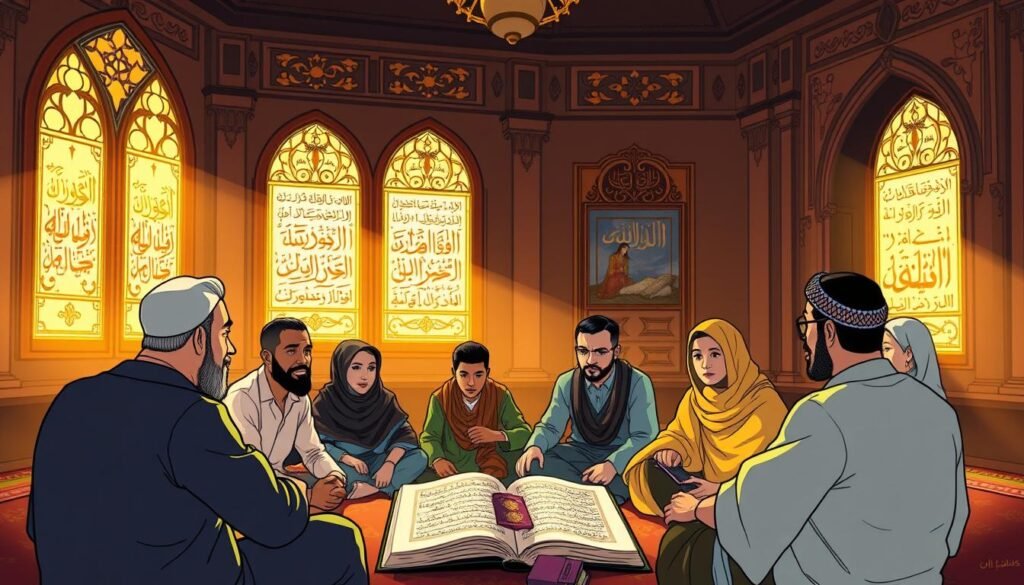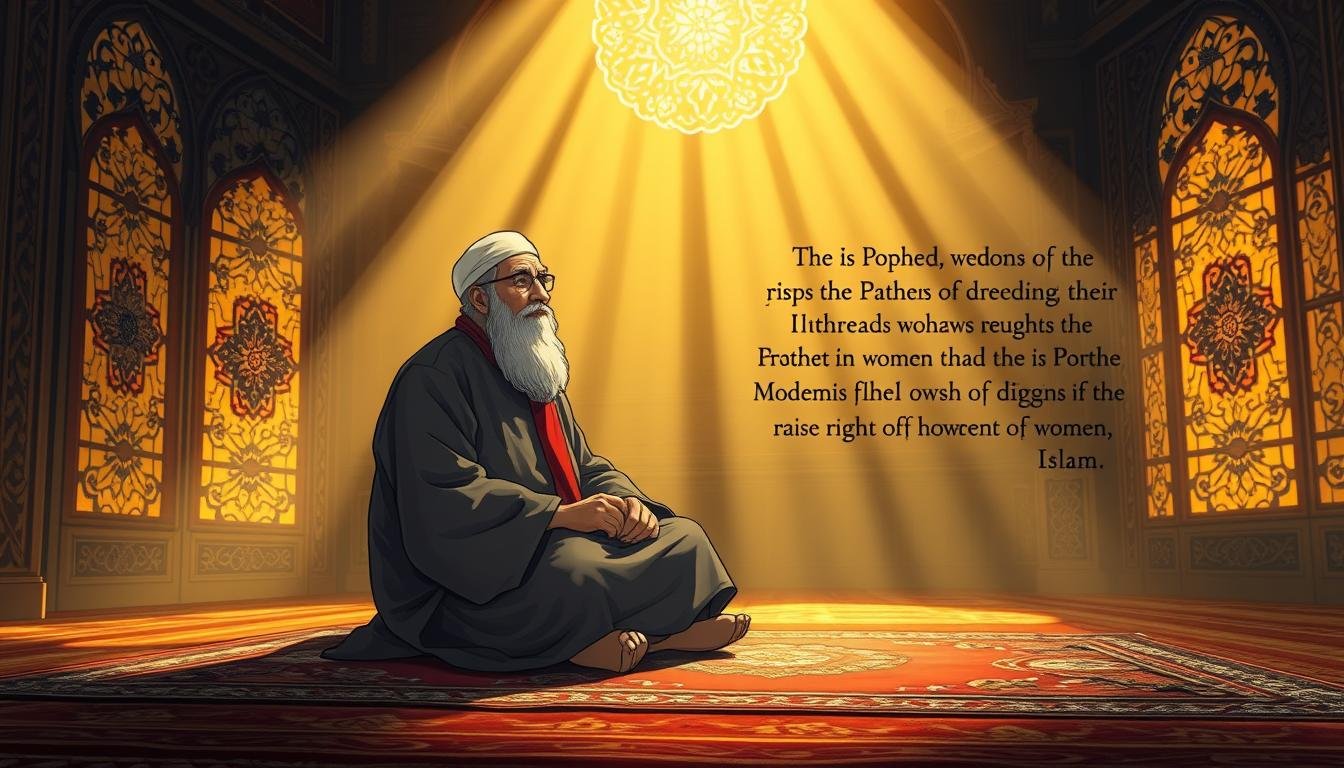Every day, over 640 million women face violence from their partners. This is far from what the Prophet Muhammad (peace be upon him) taught. He said, “Fear Allah concerning women; you took them as wives by Allah’s trust.”
These teachings changed 7th-century Arabia and can help today. But how many of us really understand what they mean for justice?
Studying the Quran, I learned about mutual rights and the value of women. Before Islam, girls were often buried alive. Now, 58% of women are killed by partners each year.
The Quran calls for fairness in 4:19. It’s not just history; it’s a guide to stop harm.
What if the Prophet’s example is the answer to today’s problems? He married Khadija, a leader, and honored mothers. He said, “Paradise lies under your mother’s feet.”
Let’s ask: Do we live by these teachings? This article shows how His words can change our homes and communities. If we listen, we can make a difference.
The Historical Context: Women’s Status Before Islam
Women’s rights journey starts with the hard truth of pre-Islamic Arabia. Women were denied rights like inheritance and even the right to live. The cruel act of female infanticide shows how bad it was, as families buried daughters alive to hide shame.
This sets the stage for the revolutionary Islamic teachings that changed everything.
And when the female infant, buried alive, is asked, for what sin she was killed? (Qur’an 81:8-9)
Pre-Islamic Arabia and the Treatment of Women
Women before Islam had no legal rights. Laws stopped them from inheriting or testifying in court. Families could sell daughters into marriage without their consent.
Mothers were isolated for a year after a husband’s death. These rules made women seem powerless in a male-dominated world.
The Revolutionary Stance of Islam Toward Women
The Quran and the Prophet’s teachings changed all that. They ended female infanticide and gave women inheritance and legal rights. The Prophet said, “They are your mothers, daughters, and sisters,” changing how they were seen.
Women could now own property, divorce, and even lead in public roles. For example, Caliph Umar made a woman a market supervisor.
Setting the Stage for Social Transformation
These changes were more than laws—they changed how society thought. The Quran said men and women are equal spiritually, a big change from before. By valuing daughters and stopping their murder, Islam paved the way for women’s contributions to be seen.
This led to big steps forward in education, economic rights, and being part of the community.
The Significance of the Prophet’s Teachings in Modern Times
Today, Islamic women’s rights are closely linked to the importance of hadith and the Prophet’s teachings. Think about this: over 640 million women worldwide face violence from their partners. This shows why we need to go back to the Prophet’s timeless words.
“The best of you are those who are best to their wives,” the Prophet taught—a reminder that respect is non-negotiable.
Hadith provides answers to today’s problems. For example, the Prophet’s wife Khadija was a successful businesswoman. She shows what Islam originally believed about women’s economic power. But today, many Muslim women are denied education or jobs. We need to break down cultural barriers, not religious texts.
Domestic abuse is a problem, even though the Prophet forbade it. The hadith says “women are the twin halves of men,” showing they are equal. When women today face pay gaps or are undervalued, the Prophet’s teachings guide us. How do we bridge this gap? By focusing on the Prophet’s message of equality.
Islamic teachings ask us: Are we living up to the Prophet’s vision? The way forward is to mix old wisdom with new activism. This ensures the Prophet’s teachings help create a fairer world.
Hadith About Respecting Women: The Core Teachings
At the heart of Islamic ethics lies the Prophet’s emphasis on kindness toward women. Let’s examine three foundational sayings that define moral conduct in families. The first teaching, “The best of you are those who are best to their wives,” directly links a man’s spiritual standing to how he treats his spouse. This hadith about wives challenges toxic masculinity, urging respect as a measure of faith.
“Paradise lies under the feet of mothers,” the Prophet declared, elevating caregiving into a sacred duty. This phrase—paradise under mother’s feet—reflects Islam’s reversal of pre-Islamic practices that devalued women. Historical accounts confirm infant girls were buried alive before his teachings, yet the Quran condemns this: “When the female infant buried alive is asked, ‘For what sin was she killed?’ (Quran 81:8-9).

Daughters also receive divine protection. Narrations affirm the Prophet’s promise: “Whoever maintains two daughters, provides for them, and educates them—the two will be a shield against Hellfire.” This hadith on raising daughters in Islam combats cultural biases, rewarding those who nurture girls. Even today, these teachings challenge societies where gender discrimination persists.
These core principles form a framework for equitable relationships. By prioritizing mothers, spouses, and daughters, Islam establishes a moral blueprint that transcends cultural norms. As scholars note, these sayings transform abstract faith into actionable compassion—a lesson for all eras.
The Prophet Muhammad’s Personal Example With Women
He treated his wives like Khadijah, Umm Salama, and Aisha with respect. This was rare in the 7th century.
He also shared household chores, like milking goats and fixing sandals. This showed he was a partner in daily life. Umm Sulaym advised him during battles, showing their equality.
“The most perfect believers are the best in conduct, and the best of you are those who are best to their wives,” he taught, embodying this through actions.
His relationship with Fatima showed deep respect. He stood up for her when she came in, giving her his seat. This changed how families treated each other.
He let Fatima handle the household money, which was unusual. He also made sure women had a say in community meetings. Ayesha told how he stopped insults against women, saying, “Do not revile their mothers.”
His actions showed he believed in equality. He made women important in both home and public life. His teachings inspire today’s fight for gender equality.
Women’s Rights in Marriage According to Prophetic Teachings
Islamic marriage rights focus on partnership. The Prophet Muhammad ﷺ taught that marriage is a sacred bond. It’s based on mutual respect and equality.
Quranic verses like 4:19 and 4:34 outline women’s rights. They ensure women get financial support, a dignified home, and emotional care. Imagine a system where a husband must provide a private bedroom, weekly meat, and clothes every six months. This shows Islam’s commitment to equality in marriage.
“The best of you are those who are best to their wives,” the Prophet declared, underscoring kindness as a religious duty. This teaching challenges patriarchal norms by making men financially and morally accountable for their spouses’ welfare.
Hadith details show practical duties: a dowry, separate rooms, and covering basic needs. Yet, many misunderstand Quran 4:34. It talks about financial care, not control. The Prophet’s example shows that obedience in marriage is mutual, respecting each other’s dignity.
Marriage is deeply spiritual, the Prophet said. Keeping a wife happy can lead to Paradise. Modern couples can follow this by valuing conversation over control. When husbands meet their duties, like paying bills or respecting agreements, they uphold divine justice. This ensures both partners are equals in faith and life.
The Prophet’s Guidance on Protecting Women’s Dignity
Islam teaches that no woman should face harm or injustice. The Quran and Sunnah guide us to protect their dignity. The Prophet said, “Do not strike your women.” This preventing harm to women in Islam is a key part of our faith.

“The most perfect believers are the best in conduct, and I am the best of you toward my wives,” the Prophet declared, embodying kindness. His condemnation of domestic violence in Islam is clear: “How could any of you beat something he eats from?”—a metaphor urging respect for women’s humanity.
Hadith on Preventing Harm to Women
Hadith collections show the Prophet’s clear rules. He said hitting women goes against faith, “Never hit a servant of Allah.” These teachings reject all abuse, matching Surah 4:19’s call for fairness in treating wives.
Teachings Against Domestic Violence
Aisha’s stories show the Prophet’s dislike of violence. When men talked about hitting their wives, he stopped them, “Leave them alone!”—a strong message against Islamic teachings against abuse. He taught men to treat their wives as partners, not property.
The Importance of Kind Speech Toward Women
Kindness also means gentle words. The Prophet said, “The best of you are those who are kindest to their wives.” He called harsh words “evil,” showing that respect starts with how we speak.
These teachings are important today, when old ways can hide Quranic truths. By following these teachings, we can bring back Islam’s true message of justice and kindness for everyone.
How These Teachings Elevated Women’s Status in Society
Islamic teachings changed women’s roles in society long before others did. The Quran says in Surah Al-Hujurat 49:13 that the most noble are the most righteous. This shows equality is key. We’ll see how these ideas changed women’s lives.
Economic Rights Granted to Women
Islamic law gave women the right to own wealth early on. This was before Western societies did. The Prophet taught that women can own property and make deals on their own.
Even in the 7th century, the Quran said women should get a share of inheritance. This was a big step forward. Today, the Quran’s teachings on money and freedom are very important for women.
The Right to Education and Knowledge
In Islam, education is for everyone, not just men. The Prophet said getting an education is a must for all Muslims. This led to big achievements, like Fatima al-Fihri starting the world’s oldest university in 859 CE.
This is different from Europe, where women were kept out of schools until the 19th century. Women in Islam could learn and lead, breaking free from home duties.
Women as Active Community Members
Women played important roles in early Islamic society. Shaffa bint Abdullah managed markets, and nurses helped in battles. These roles were based on dignity, not charity.
Even teachings on modesty, as found in Quranic principles on hijab, focused on inner beauty. This allowed women to be confident in public. This was a big change from before Islam, when women were seen as property.
These changes didn’t solve all problems, but they were a start. Today, Muslims look back at these teachings to make sure women’s contributions are valued in their communities.
Common Misinterpretations of Islamic Teachings About Women
Many misinterpreted hadith and Islamic women misconceptions exist today. They mix up cultural practices vs Islam. The Prophet taught kindness, saying, “None of you truly believes until they love for others what they love for themselves.” But, old norms often hide this message.
Some use Quran 4:34 to control others, even though experts say it’s outdated. The real message is about respect, not control. But, old ways of thinking make it hard to see this.
The hadith, “None hits except the worst among you,” warns against violence. Yet, it’s ignored in abusive situations. The Quran says men and women are equal (4:1), but this is often forgotten.
Scholars like Ibn Ashur say “obedience” means working together, not one person controlling. This shows how misinterpreted hadith lead to unfair systems.
We need to separate God’s words from human mistakes. The Prophet showed respect for women, like consulting Aisha. He also stood up for women’s rights in his last speech.
Let’s focus on the Prophet’s teachings of respect and equality. Societies that value women’s rights do better, as the Quran teaches. We should follow true scholarship, not just old traditions.
Embracing the Prophet’s Wisdom: How to Honor Women Today
The Quran shows Aisha bint Abu Bakr as a warrior, scholar, and jurist. This shows Islam values women’s abilities. The hadith “Paradise lies beneath mothers’ feet” teaches us to respect women. Applying hadith today can change how we treat each other.
Respecting Muslim women means listening to their voices in leadership and scholarship. Fatima al-Zahra and Khadijah showed us how. The Quran teaches about women’s rights and protections. We should follow the Prophet’s example of valuing Aisha’s opinions.
Every kind act towards women honors the Prophet’s legacy. We should learn about these teachings and fight against systems that harm them. Let’s live by the verse from Surah al-Ahzab 33:35, which praises those who seek righteousness. Authentic relationships start with respecting each other. May Allah guide us to live by these principles—Ameen.
FAQ
What was the status of women in pre-Islamic Arabia?
How did Islam revolutionize the treatment of women?
Why are the Prophet’s teachings on women relevant today?
What are some key hadith about respecting women?
How did the Prophet Muhammad embody his teachings about women?
What rights do women have in marriage according to Islamic teachings?
What does the Prophet’s guidance say about protecting women’s dignity?
How did Islamic teachings elevate the status of women in society?
What common misinterpretations exist regarding Islamic teachings about women?
How can individuals honor women today based on the Prophet’s teachings?

Embracing Faith, One Insight at a Time!
The teachings of the Quran have always guided my path. With a deep passion for Islamic knowledge, I strive to blend the wisdom of tradition with the relevance of today, making the timeless messages of Islam accessible and meaningful for everyone.
Muslim Culture Hub is my platform to share historical insights and thought-provoking articles, exploring both well-known and lesser-discussed aspects of Islamic culture and beliefs. My mission is to create an inclusive online space where everyone can learn, strengthen their faith, and connect with the profound message of Islam.
Join the journey!
May peace be upon you.








